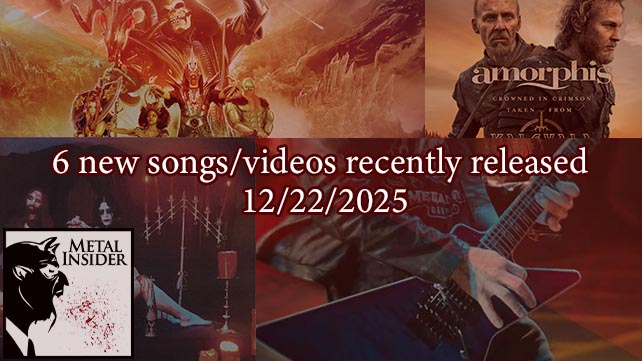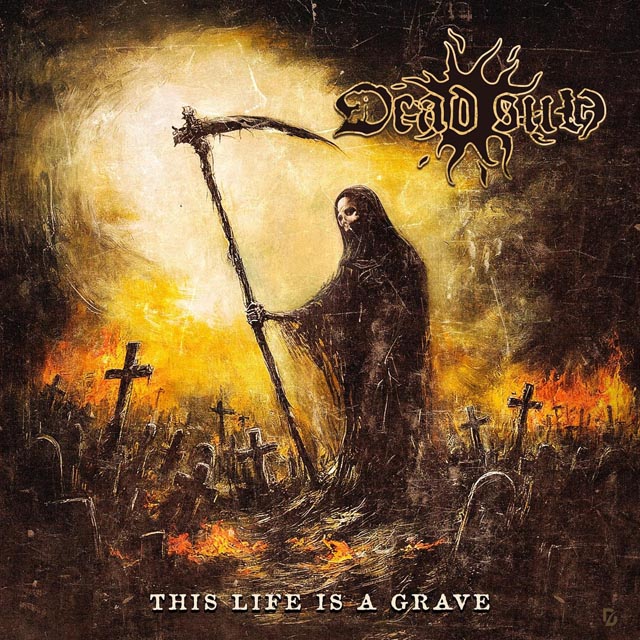
Chicago hardcore act Riotous Indignation just released their debut EP, Violentus Musicae, and with it, have unveiled an NSFW video for the song “Secret Societies.” Vocalist Mike Repel says that most of the songs on the EP are angry social commentary about the world we live in.” That certainly fits the nearly nine-minute long video. Starting with images of masons, Nostradamus and more, there’s also plenty of quick flashes of Obama, Hillary Clinton deleting emails, Bush, Trump, war footage and more. Here’s what Repel says about the video: “Most metal songs are rated by how brutal they are, and as this video will show you; there is nothing more brutal than the reality of the world you live in today.” Check it out below.
[youtube]https://youtu.be/3OoAuaUfRB8[/youtube]
And while Riotous Indignation is a new band, Repel has been around the scene for a while, enough for him to have written The Music Industry Self Help Guide. We spoke to him about the book and his knowledge. His experience managing, promoting and marketing the bands he’s been in led him to write the book. Stating that every band generally has a member that steps up and does that work, he wanted to pass on the knowledge he’s gained. “Overall, many artists don’t seem to know what steps they need to take to create a foundation for themselves that will allow for any forward momentum or upward mobility,” he says. “Myself, and most other people that are actually a part of any organized independent music scene today can easily take this knowledge for granted because we happen to be “in the know” and are fortunate enough to be part of a larger network. But for a musician who is starting out, it’s much more difficult, and even now in 2016 I am still meeting musicians who don’t use social media or know how to navigate it, much less approach the myriad of other tasks that need to be done.”
Another issue he found is that many artists think they’re going to automatically be famous without putting in the effort, which is another thing his book seeks to dispel. “When you combine the inability to navigate a realistic path towards your goals with a poor work ethic and fantastic delusions about how people get famous, your chances of ever doing anything with yourself or your music are nil.”
Given that Riotous Indignation is a hardcore band, we asked Repel if the information in the book is specific to heavy music or if it’s universal. Repel says it applies to not just any kind of artist, but that it’s gotten interest from film companies as well. “This book delves into brand development, which as an artist or band member; you are basically a walking, living product line,” he says. “You are your brand, period. As an emerging brand you need to create visibility and awareness for yourself in an oversaturated market where your message can easily be lost. This is done through multiple steps including creating an online presence, cultivating and maintaining a fan base, marketing, performing, and coordinating press and public appearances in multiple markets. This visibility also takes time and effort to create and can cost money, so ideally an artist should establish ways to monetize their product, and this book helps with that as well.
When asked how he’s seen the industry change over the last few years, Repel talks about the way people are consuming music. “In the last few decades, we have watched a shrinking vinyl market give way to the digital download, and now that download revenues have been completely undermined by the streaming model, we are now seeing a healthy return in vinyl manufacturing that has a backlog on orders of 16-18 weeks,” he says. “These developments have also resulted in a decision by Apple executives to phase out and completely abandon the iTunes system by 2019 or 2020 because this business model just cannot compete with streaming. Piracy and streaming have completely decimated artist revenues and this is hurting everyone from the independent market to the major labels. DMCA takedown notices are nothing more than a band-aid as they do not give way to criminal or civil prosecution, so efforts to contain illegal file sharing are lacking the teeth that are necessary to take a bite out the ass of this problem. Should the vinyl comeback deem to be the most feasible way to secure revenues, which already appears to be happening, then I only see one commercial purpose left for digital music, and that is for broadcasting, but even that is now questionable.?
Repel also questions how the digital landscape will survive. “Technology has brought us streaming as an alternate way to broadcast music which will cause more of a shift away from terrestrial radio until it is abandoned altogether,” he says. “Digital music has paved the way for several independent podcasters and radio stations to spring up and start their own radio shows, which has served consumers of this era well, as there are so many genres and subgenres of music that it has definitely filled a consumer need. However, Live365 is showing all signs of a total collapse and will most likely be shutting down soon, and Pandora is pandering to its investors for more capital contributions to keep itself afloat. Both of these business models are showing problems of sustainability which makes me wonder how Pandora is able to claim a value of $50 billion unless it is grossly inflating this number in an effort to keep its investors from jumping ship. As all of this is happening, large corporations are realizing massive profits while the artists themselves get paid less and less. As of today, it would take approximately 288 million streams of a songwriter’s music for him to match the salary of an average Spotify employee. This is horrible, and it is such a far cry from what artists and labels were making in the 1980’s that you wonder how long any of this is even going to last.
You can read the first three chapters of The Music Industry Self Help Guide here.
You can order Violentus Musicae here.










